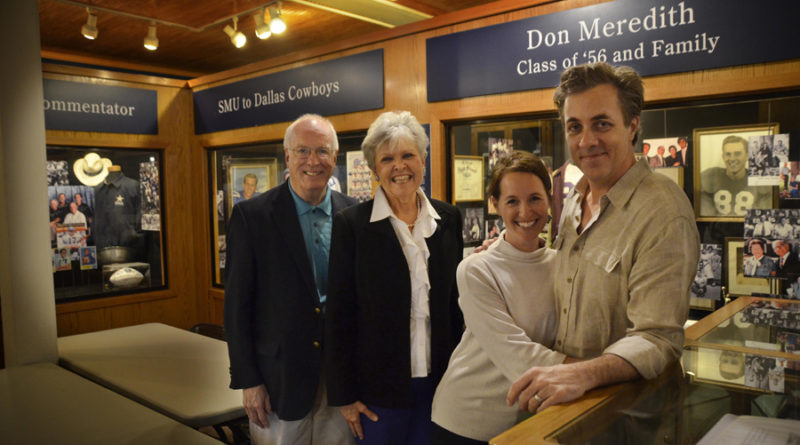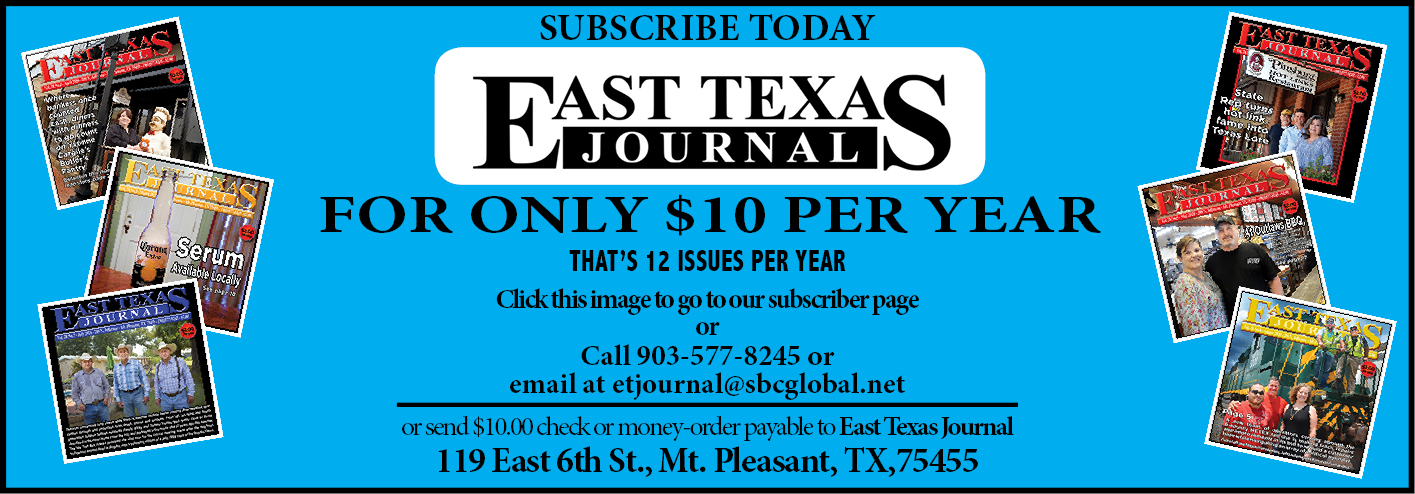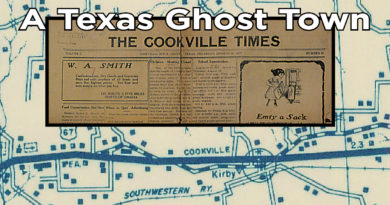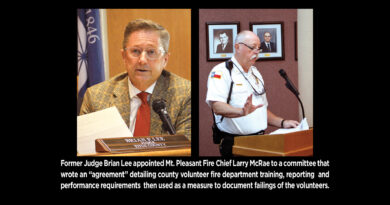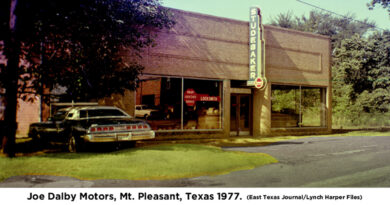Life takes a Mt. Vernon magic turn

MT. VERNON – The trail of this chapter of a larger tale story goes back 35 years to the moment Ken Greer met B.F. Hicks.
Listen:
A globe trotting cinematographer and a music promoter whose family shaped the Texas oil and cattle business, started Six Flags and landed the NFL’s Cowboys in Dallas were in the entourage Michael and Amit Meredith brought to town.
This hardly ever happens in Mt. Vernon.
They came for the Texas debut of the Ice Bowl documentary. (Story, page __)
“It started the day I met Ken Greer,” said Michael Meredith, who first came here on a November Saturday, just over a year ago.
“November 6, 2016,” to be exact, said Mr. Greer, who arrived here 35 years ago as the new President of 1st National Bank.
Later, he persuaded his board to buy the city’s old fire station because local attorney B.F. Hicks of the Franklin County Historical Association wanted it as the town’s first museum.
Years passed.
One day after that, Mr. Greer and Frankie Cooper, another 1st National Banker, flew to Sante Fe to ask Don Meredith for his help in creating a Don Meredith exhibit for the museum.
Years passed.


Mr. Greer was the volunteer docent working the museum the day Michael and Amit arrived unannounced and unknown. A couple with two children, Michael said they were from New York and they came so their children could see the exhibit about their grandfather.
Time missed a beat.
Mr. Greer stood by the museum door he unlocks for Saturday hours one day each month and he watched the latest generations of the Meredith family and thought about that.
“Life in Mt. Vernon has benefits,” he sees. It’s a spiritual thing, but visible on clear mornings.
Don Meredith had conditions.
If there was going to be an exhibit, he wanted it to speak of his people and his town before him. Having taken to heart what he learned growing up here, he meant to nurture Mt. Vernon magic, treat it as a thing alive.
“The thing you need to know is that opening the Meredith exhibit went hand in hand with Don endowing a perpetual Rotary Club scholarship for graduating seniors,” Mr. Greer said.
As the Cowboy quarterback who turned a losing club into a championship-caliber team, Don Meredith’s a legend. American folklore includes his love of fun and a quick wit that won him an Emy and made Monday Night Football ratings soar.
And he never lost his small town side.
“He didn’t want to be put on a pedestal,” Frankie Cooper said. “Rather than stepping into the limelight, he wanted to be part of a museum shining its limelight on his town.”
He tied the Meredith exhibit to the scholarship as a condition of the agreement, then wrote the check. There’s a shade over $300,000 in the Rotary Club’s Jeff and Hazel Meredith Scholarship fund.
A revealing story was written about him the week after he died. Reporter Michael Granberry’s piece was at the bottom of page 23 of a Sunday edition of the Dallas Morning News, written from an interview he’d taped in 1982.
He made no bones about Meredith being his hero.
“When you were a kid, you say that I was your hero. But I don’t even know, really, what that means,” Don Meredith said. He said he hoped that anyone’s adulation carried a deeper component than anything about his wit or his athletic prowess.
“I would like to think,” he said, “that if someone admires me for anything, it’s for decency.”
In addition to bringing his children, Michael Meredith came that Saturday looking for what he’s found here, what he was looking for when he began work on a documentary as “a love letter to my dad.”
His research about the early years of the Cowboy franchise led him to Angus Wynne III. Mr Wynne is the nephew of Bedford Wynne, whose name was the answer to the January 28, 2009 Cowboy fan website trivia question under the headline, “Forgotten Founder of the Dallas Cowboys.”
“He was my favorite uncle,” said Mr. Wynne. “He was an attorney who became a promoter.”
When the National Football League announced plans to expand, Bedford Wynne leapt at the opportunity for Dallas.
Michael Meredith tracked him down for background about his film ideas, then invited him to Mt. Vernon because they’re friends now.

In 1959, Angus Wynn III’s Uncle Bedford was “in the newspaper so often that people assumed he was an equal partner with Clint Murchison,” whose majority interest makes him the better known Cowboy backer in historical footnotes. Bedford Wynn was a minority stockholder with a sliver of interest he sold after the franchise got humming.
But he was the Dallas hustler at the table in Miami in 1960 when team owners voted to bring the Dallas Cowboys into the NFL.
One time he partnered up with Texas cattlemen who shelled out $200,000 for a Black Angus bull to diversify the purebred business that in 1960’s Texas was high-centered on Herefords.
“He loved sports,” said Angus Wynne III. “He was one of those guys who could put you to sleep reciting player stats.”
Get this, y’all.
The relationship between the Wynne and Murchison families began with his brother, Toddie Lee Wynne, the attorney who represented the Murchison family during the creation of the American Liberty Oil Company.
That’s the outfit that built the refinery in Mt. Pleasant following the 1936 oil strike at Talco.
Angus Wynne II started Six Flags.
Like his favorite uncle, Angus III is a colorful promoter, a child of the 60’s, a University of Texas alum. On July 4, 1969, he had a good time at the Atlanta International Pop Festival so he teamed up with the music festival organizer, formed a company they called Interpop Superfest that lived through Labor Day when they brought the Texas International Pop Festival to Lewisville.
Two weeks after Woodstock, the Texas edition featured the same caravan of musicians on the road in the summer of 69 in three days of Metroplex shows.
It turned Texas on to Santana, Sly and the Family Stone, Janis Joplin, Canned Heat, Chicago Transit Authority and others at the concert that turned Hugh Romney, head of the Hog Farm Commune, into Wavy Gravy.
In keeping with the principles of the hippie era coming out of the Texas closet, Wavy Gravy performed on the free stage Mr. Wynne provided for bands and fans not into the establishment protocol of paying for tickets.
Certified Texans should know he booked Ken Keesey’s Merry Pranksters to run the free stage and camping era.
For bonus points, you’ll need to remember that Tom Wolfe immortalized the Merry Pranksters in The Electric Kool-Aid Acid Test describing their touring the country in a psychedelic school bus doling out hits of acid. That said, it should be known that Angus Wynne was well behaved in Mt. Vernon. He was invisible that night. And I called him up to ask if he minded me airing the record.)
“Whatever works,” said Angus Wynne III, whose movie credits can be found on line. He’s an actor as well as a music promoter.
The other exotic in Michael Meredith’s entourage, the globe trotting cinematographer, would be Troy Word, noted on line for both film and still photography, lots of it relating to fashion work linked to celebrity clients and editorial work for advertisers. Mr. Word escaped Oklahoma at 16, lived at the YMCA while studying at New York’s School of Visual Arts and got his introduction into the world of celebrities and fashion still work shooting New York’s night life.
The more down-to-earth side of an exotic band associated with the newly-treasured documentary that can be seen at the Mt. Vernon Fire Station Museum’s Meredith exhibit emerged the morning after the Friday night show.
“Frankie Cooper picked us up and we spent the day touring the town,” Mr. Word said, going on to describe the pleasure they found in Mt. Vernon’s tradition of hospitality. Frankie showed them where the Merediths lived. They went out for pizza.
“She’s the hero in all of this,” said Mr. Word, a veteran film director with an ear for hometown story elements.
With less than a week’s notice, after Michael Meredith cut the deal with the NFL to air his film in Mt. Vernon, Frankie Cooper orchestrated the event and arranged ticket sales in accordance with Michael Meredith’s wish that the proceeds benefit the Franklin County Historical Association.
Besides buying FCHA’s first museum location and honoring terms with which Don Meredith agreed to pass his personal treasures for the Meredith Exhibit, since the arrival of Ken Greer as president, 1st National has donated its former bank building to the town, working with the Key Club to bring it back to life as the town library. Same with the building converted to the Chamber of Commerce office.
Whether it’s coincidental or providential, during those same years the bank has grown from 11 to 36 employees.
Things being as they should be bring to mind Don Meredith’s spoken desire for decency above whatever else.

